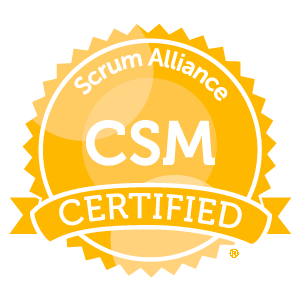
Overview of the CSM Certification
The Certified Scrum Master (CSM) certification from Scrum Alliance is one of the most recognized Agile certifications worldwide. This certification is designed for Scrum Masters and Agile practitioners who want to validate their understanding of Scrum and improve their ability to lead Agile teams effectively.
Importance of the Certification in the Agile Community
The CSM certification is highly valued in the Agile community. It demonstrates a foundational understanding of Scrum practices and Agile principles, equipping professionals with the skills necessary to support Agile teams in delivering value iteratively.

Key Facts :
- Date Launched: 2002
- Founder: Scrum Alliance
- Number of Certified Professionals: Over 1,000,000 globally
- Global Recognition: The CSM certification is respected worldwide, particularly among organizations implementing Scrum. It is a key credential for professionals looking to lead or support Scrum teams.
Target Audience :
The CSM certification is aimed at Scrum Masters, project managers, team leads, and anyone involved in Agile projects. It is especially beneficial for:
- Aspiring Scrum Masters: Individuals looking to start or advance a career in Agile.
- Project Managers and Team Leads: Leaders who aim to implement or support Agile practices.
- Product Owners: Professionals working closely with development teams who want to strengthen their understanding of Scrum.
- Anyone Working with Scrum Teams: Individuals in roles supporting or collaborating with Scrum teams who seek foundational knowledge of Scrum.
Certification Objectives
The Certified Scrum Master (CSM) certification validates essential skills and knowledge areas required to support Agile teams, including:
- Understanding Scrum Framework: Mastery of Scrum roles, events, and artifacts, and how they contribute to Agile practices.
- Facilitating Team Collaboration: Skills to support and enable team members to work effectively together.
- Leading Scrum Events: Ability to facilitate key Scrum events such as Sprint Planning, Daily Scrum, and Retrospectives.
- Commitment to Continuous Improvement: Emphasis on improving team practices and promoting an Agile mindset.

Skills and Knowledge Gained

The CSM certification provides professionals with crucial skills and knowledge to lead Agile teams effectively. Key skills include:
- Scrum Fundamentals: In-depth understanding of Scrum roles, events, and artifacts.
- Effective Facilitation: Skills for facilitating Scrum events and fostering team collaboration.
- Agile Mindset: Embracing Agile principles to create an environment focused on iterative delivery.
- Continuous Improvement: Techniques for guiding teams in retrospectives and supporting ongoing improvement.
Detailed Breakdown of the Certification Process
Steps to Certification :
Pre-requisites: No formal prerequisites are required for the CSM certification, though a basic understanding of Scrum is recommended. Reviewing the Scrum Guide can provide foundational knowledge.
Training Requirements: Completing a formal training course is required. Scrum Alliance offers a two-day CSM workshop led by Certified Scrum Trainers (CSTs), providing hands-on experience in Scrum practices and preparing candidates for the certification exam.
Exam Format :
- Number of Questions: 50
- Question Type: Multiple-choice and true/false
- Time Limit: 60 minutes
- Passing Score: 74%
- Retake Policy: Candidates who do not pass can retake the exam after completing additional preparation.
Certification Levels :
Scrum Alliance offers various levels of Scrum Master certification, with the CSM serving as the foundational level:
- CSM: Validates basic Scrum knowledge and skills.
- A-CSM: Focuses on advanced Scrum practices and team facilitation.
- CSP-SM: Certifies mastery of Scrum practices in complex environments.
Recertification :
The Certified Scrum Master certification requires renewal every two years, ensuring that certified professionals stay current with evolving Scrum practices.

Key Benefits of the Certification for Organizations

Impact on Teams and Organizations :
Organizations with CSM-certified professionals benefit from improved team collaboration, higher project success rates, and more efficient delivery. Certified Scrum Masters help teams adapt to changing requirements and achieve Agile goals effectively.
Real-World Application :
At companies like IBM and Google, CSM-certified professionals have helped reduce project delivery times by 20% while enhancing team alignment and collaboration. Scrum practices enable these teams to respond quickly to changing market conditions.
Industry Recognition :
The CSM certification is recognized by leading companies such as Microsoft, Amazon, Cisco, and Deloitte, all of which prioritize hiring Scrum Masters with this credential. This global recognition makes CSM one of the most valued certifications in Agile project management.
Case Studies :
At Spotify, implementing Scrum with CSM-certified Scrum Masters led to a 25% improvement in product delivery speed and a boost in team morale. Another example is Toyota, where CSM-certified professionals supported Agile transformations that improved collaboration and reduced development cycle times.
Certification Costs and Value Proposition
Cost of Certification :
The CSM certification exam costs vary depending on the training provider but generally range from $500 to $1,500. The required two-day CSM workshop is included in this price, providing candidates with both training and certification in one package.
Return on Investment (ROI) :
The ROI for CSM certification is significant. Professionals with the CSM credential report increased job opportunities and often experience salary increases within their first year of certification. CSM-certified Scrum Masters are frequently considered for leadership roles within Agile transformations, enhancing their career prospects.
Financial Aid and Discounts :
While Scrum Alliance does not offer financial aid directly, many training providers provide group discounts for companies certifying multiple employees. Organizations that sponsor training often benefit from reduced rates for larger teams.

Comparison with Other Certifications

Competitor Analysis :
The CSM certification is often compared to the Professional Scrum Master (PSM) certification from Scrum.org and the SAFe® Scrum Master (SSM) certification from Scaled Agile. While PSM and CSM both focus on Scrum, CSM includes mandatory training, which provides hands-on practice. PSM is known for its more rigorous exam, while CSM is often preferred for entry-level Scrum Masters.
Unique Features :
CSM is unique for its focus on hands-on training through a mandatory two-day workshop, which ensures candidates gain practical experience with Scrum. Unlike PSM, which does not require renewal, the CSM requires biennial renewal, promoting continuous learning.
Industry Trends :
With the increased adoption of Agile methodologies across industries, certifications like Certified Scrum Master are becoming essential. The CSM certification emphasizes team facilitation, collaboration, and continuous improvement, making it ideal for professionals working in Agile and cross-functional teams.
The Future of Agile and This Certification
Emerging Trends :
As Agile practices continue to evolve, certifications like CSM are adapting to meet the needs of remote teams, Agile at scale, and AI-driven project management. The CSM certification remains relevant, equipping Scrum Masters with foundational skills for supporting modern Agile teams.
Future Updates to the Certification :
Scrum Alliance regularly reviews and updates the Certified Scrum Master certification to reflect evolving industry practices. Future updates may include greater focus on remote Scrum facilitation and the use of Agile metrics for performance improvement.
Relevance in a Changing Market :
As companies face increasingly complex project environments and dynamic market conditions, the demand for certified Scrum Masters is growing. The CSM certification equips professionals with skills to lead adaptive, cross-functional teams in fast-paced industries.

Conclusion
The Certified Scrum Master (CSM) certification is a key credential for professionals aiming to succeed in Agile environments. By validating foundational Scrum knowledge and practical skills, the CSM certification prepares individuals to lead and support Agile teams effectively. As Agile practices continue to grow, CSM-certified professionals will be well-positioned to drive success within their teams and organizations, making this certification a valuable asset in a dynamic job market.